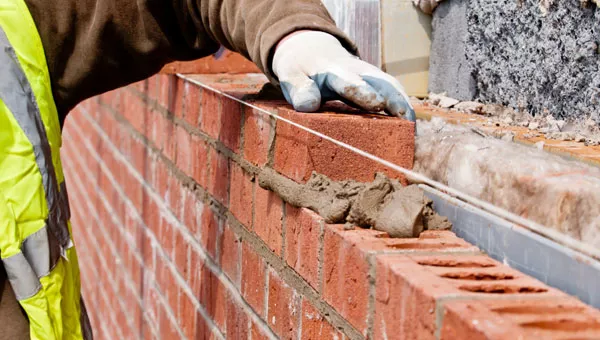Expert Step Repair Services: Guarantee Safety and Resilience
Expert Step Repair Services: Guarantee Safety and Resilience
Blog Article
Unlocking the Tricks of Lasting Masonry Building And Construction Practices for Eco-Friendly Buildings
In the realm of contemporary building, the quest of lasting techniques has actually become critical. Amongst the myriad approaches to green building, lasting masonry building stands apart as a reliable and long lasting method that holds a wide range of untapped potential. From the choice of materials to cutting-edge building and construction strategies, the keys to achieving sustainability within stonework building and construction are diverse and appealing. By discovering the advantages, materials, strategies, and future trends of sustainable stonework, a much deeper understanding of just how these techniques can form the future of green structures arises.
Benefits of Lasting Masonry Construction
Accepting sustainable masonry building and construction techniques not only decreases environmental impact yet also uses long-term economic benefits to building contractors and communities. By using materials like recycled bricks, obstructs, and rocks, home builders can considerably lower the carbon footprint of their tasks while promoting source efficiency. Additionally, lasting stonework construction techniques, such as appropriate insulation and thermal mass properties, can improve power performance within structures, bring about decreased functional expenses gradually.
Additionally, the sturdiness and resilience of masonry structures contribute to long-lasting economic advantages. Structures created making use of sustainable masonry methods typically need much less maintenance and fixing, translating to cost financial savings for home builders and homeowner. The longevity of masonry materials also guarantees that structures continue to be stable and protected, lowering the demand for regular remodellings or replacements.
Eco-Friendly Masonry Products
Utilizing environmentally friendly masonry materials is a critical action towards improving the sustainability of building practices and lessening environmental influence while taking full advantage of lasting economic benefits. Sustainable masonry products are sourced, generated, and used in a manner that decreases general ecological effect. Products such as recycled blocks, recovered rock, and sustainable cinder block are coming to be progressively prominent options for eco-conscious builders. Recycled blocks, for instance, not only draw away waste from landfills yet likewise call for much less energy to generate contrasted to brand-new blocks. Reclaimed stone supplies an one-of-a-kind aesthetic allure while reducing the demand for brand-new quarrying. Lasting concrete blocks integrate recycled accumulations and may feature enhanced insulation buildings, contributing to energy effectiveness in structures.
Additionally, natural products like adobe, rammed planet, and straw bales offer outstanding thermal mass residential properties, minimizing the demand for home heating and cooling power. These products are usually locally readily available, promoting regional economies and reducing visit transportation-related carbon emissions. By choosing environment-friendly stonework materials, building jobs can substantially lower their environmental impact and add to the production of much healthier, much more lasting constructed settings.
Energy-Efficient Stonework Strategies
Power performance plays an important function in improving the sustainability of stonework building practices. One essential energy-efficient masonry strategy is the usage of thermal mass, which involves incorporating thick materials like concrete or brick into the building's framework to absorb and keep heat.

Innovations in Sustainable Stonework
Recent advancements in lasting stonework practices have caused cutting-edge techniques that are improving the construction market. One such technology is the development of self-healing concrete, which uses germs embedded within the concrete to heal splits autonomously. This development not just lowers maintenance costs yet additionally improves the toughness of masonry structures, adding to their sustainability.
Another significant development is using recycled accumulations in masonry building - masonry contractor. By This Site including materials such as crushed ceramic waste or recycled glass right into concrete mixes, builders can lower the ecological effect of construction jobs while maintaining structural stability. This practice not only draws away waste from land fills but additionally preserves all-natural resources, making it a key innovation in sustainable masonry building and construction
Additionally, the integration of digital layout devices, such as Structure Information Modeling (BIM), is reinventing the means masonry frameworks are planned and built. BIM enables more specific computations, reduced product waste, and boosted energy effectiveness, inevitably leading to more lasting building techniques. These technologies more jointly represent a promising future for sustainable masonry building and construction in the age of environment-friendly structures.
Future Trends in Masonry Sustainability
With the cutting-edge strides made in lasting stonework practices, the future fads in stonework sustainability are poised to additional change the construction sector. Among the key fads forming the future of stonework sustainability is the boosted integration of innovation. Improvements such as Structure Information Modeling (BIM) and digital reality simulations are being utilized to optimize stonework building processes, resulting in minimized product waste and enhanced power efficiency in structures.
Furthermore, the development of unique sustainable materials is readied to play a significant duty in improving the eco-friendliness of masonry building and construction. masonry contractor. Technologies like self-healing concrete, recycled accumulations, and bio-based binders are gaining traction for their capability to decrease environmental impact while maintaining architectural honesty

Conclusion
In final thought, lasting stonework building practices provide countless benefits for environmentally friendly buildings. masonry contractor. Developments in sustainable stonework are continually being created to further boost the ecological performance of structures.
Report this page